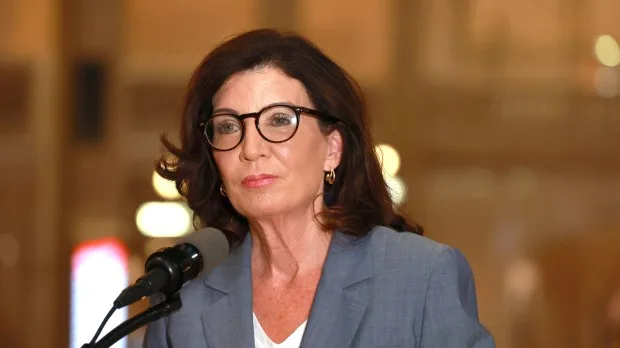Legislation to create a New York commission to study reparations for the descendants of slaves was approved Tuesday by Gov. Hochul, who called on New Yorkers to “rebuke and not excuse our role in benefiting from the institution of slavery.”
Hochul, a Democrat, signed the bill at a ceremony on the Upper West Side of Manhattan six months after the state Legislature passed the plan. The governor said the commission would “make it possible to have a conversation — a reasoned debate — about what we want the future to look like.”
Chattel slavery lasted for two centuries in New York and has cast a long and painful shadow. Slaves built historic swaths of New York City, including the wall for which Wall St. is named and the original Broadway thoroughfare. In 1730, an estimated 42% of New York City’s population owned slaves.
Now, New York State’s schools are the nation’s most segregated, according to a study from the University of California, Los Angeles. And the state’s racial wealth gap is vast: white households have a median net worth almost 15 times larger than Black households’ median net worth, the New York City comptroller’s office reported this month.
Black New Yorkers face an uphill battle in closing the racial wealth gap. In the state, Black workers make about 74 cents for every dollar earned by white workers, according to federal Labor Department data.
“The truth is, we are all held back when millions of our neighbors struggle to lift their families up generation after generation; struggle to give their kids a good education, quality health care that they deserve; struggle while fighting the indignities of racism,” Hochul said.
The governor said the after-effects of slavery in New York demand “more than giving people a simple apology 150 years later,” referring to the nationwide abolition of slavery in 1865. New York abolished slavery in 1827.
“To those that think that even having this conversation is unfair or wrong, I say it would be wrong not to have it,” Hochul declared at the bill signing ceremony. “To bend that arc of justice, we have to be able to talk about the hard things.”
The legislation calls for a commission with nine members: three appointed by the governor, three by the Assembly and three by the Senate. The panel is to report its findings and recommendations on reparations within a year of the launch of its work.
The recommendations would not be binding.
The governor, who signed the legislation with less than two weeks to go before an end-of-year deadline to act on the plan, acknowledged that she had some reservations about the concept. White Americans broadly oppose reparations, while Black Americans largely support them, according to polling.

“There’s a part of me that worries about leaping into this conversation because of the racial division and strife it could sow,” the governor said.
Assembly Speaker Carl Heastie, a Bronx Democrat, said at the ceremony that Hochul had put “doing what’s right over what may be perceived as the political thing to do.”
Overall, more than two-thirds of Americans said in a 2021 Pew Research Center survey that they opposed reparations for the descendants of slaves.
But New Yorkers appear relatively amenable to the idea of a reparations commission: 45% voiced support for such a panel in a statewide Siena College survey conducted in the summer. In the poll, 37% of respondents said a reparations commission would be bad for New York.
State Sen. Rob Ortt of Niagara County, his chamber’s top Republican, said in a statement Tuesday that the “commission’s recommendations will be unrealistic, will come at an astronomical cost to all New Yorkers, and will only further divide our state.”
“The reparations of slavery were paid with the blood and lives of hundreds of thousands of Americans who fought to end slavery during the Civil War,” Ortt said in the statement.
Explaining her move, Hochul cited evidence that white supremacism is “alive and well” in New York, recalling the slaying of 10 Black shoppers by a white gunman in her hometown of Buffalo last year. And she pointed disapprovingly at racial inequality in the state she leads.
Hochul said the commission would “strengthen the bonds that bring us close together” if it provides a path to help ameliorate racial disparities.
Her authorization of the bill came three years after California became the first state to create a reparations task force. New York’s plan passed by a 106-to-41 vote in the state Assembly and a 41-to-21 vote in the state Senate.
At the bill signing ceremony, state Sen. James Sanders, the Queens Democrat who sponsored the bill in his chamber, said he could envision “the new New York that we’re building.”
“I can see it arising: A place where the color of your skin is no more important than the color of your eyes,” he said. “A place where you’ll be judged by the content of your character, and not by your melanin.”


